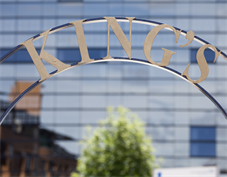King’s College Hospital’s new Critical Care Unit to re-open
19 January 2021 - King’s College Hospital is re-opening its new Critical Care Unit (CCU) to help deal with the capital’s recent surge in COVID-19 patients

The state of the art facility played a key role in the first wave of the pandemic but has been closed since the summer, pending the completion of remedial works to improve fire safety.
Following a detailed risk assessment and the development of comprehensive mitigation plans with London Fire Brigade (LFB), the unit is now set to re-enter service and provide specialist CCU beds.
After the Trust formally agreed the decision, King’s Chief Executive, Professor Clive Kay, said: “Reopening the unit will give us a better working environment for critical care staff, a better care environment for very sick patients, and gives us increased flexibility in our pandemic response.”
He added: “London Fire Brigade has been very supportive and given us some constructive advice on our action plan. Brigade staff have visited the site and reviewed the works, and its Principal Fire Engineer has now confirmed it is appropriate for us to occupy the building.”
Dr Tom Best MBE, Clinical Director for Critical Care at King’s, said: “The reopening of this unit is good news for both our patients and our staff as it is much easier to provide the best support in this exceptionally high quality purpose built setting. These critical care beds will also relieve some of the pressures elsewhere in our hospital and allow all our teams to ensure their patients receive the best possible treatment and care.”
Plans are currently being finalised and a phased reoccupation of the unit will begin this week (week commencing 18 January).
The CCU has undergone an improvement programme since it closed in July. This includes completing works on the internal fire barriers of the CCU building and the extensive testing of the modern fire protection system. The latter includes the fire alarm, water mist, ventilation and smoke extraction systems.
Among other safeguards in the Trust’s 14-point action plan is the mobilisation of a 24/7 competent and appropriately trained fire watch team to carry out patrols of the main escape routes and areas of circulation.
This arrangement will be an interim one, for a period of 6-12 months or until such time when it can be established whether the building’s façade can safely be replaced whilst staff and patients remain in occupation. Design work on this full remediation of the façade is progressing at pace, meaning construction work should start later in the year.
The priority is to ensure that staff can continue to deliver excellent patient care in a safe and secure environment.
